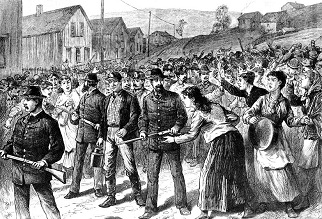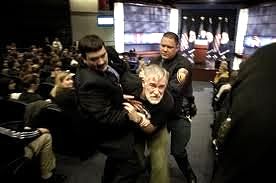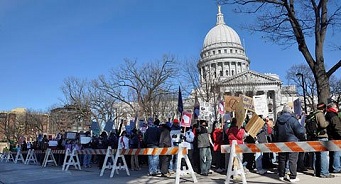Stephen Lendman
 Pinkerton guards escort strikebreakers in Buchtel, Ohio, 1884
Pinkerton guards escort strikebreakers in Buchtel, Ohio, 1884It dates from America's 19th century industrial expansion when workers moved away from farms to factories, mines, and other urban environments, with harsh working conditions, low pay, and other exploitive abuses. As a result, labor movements emerged, organizing workers to lobby for better rights and safer conditions, pitting them against corporate bosses yielding nothing without a fight.
During unionism's formative years, workers were terrorized for organizing. In company-owned towns, they were thrown out of homes, beaten, shot, and hanged to leave management empowered.
The 1892 Homestead Steel Works strike culminated in a violent battle between Pinkerton agents and workers. As a result, seven were killed, dozens wounded, and, at the behest of Andrew Carnegie, owner of Carnegie Steel, Governor Robert Pattison sent National Guard troops to evict workers from company homes, make arrests, and help CEO Henry Clay Frick's union busting strategy. It worked, preventing organizing of the Works for the next 40 years.
The Federation of Organized Trades and Labor Unions chose May 1, 1886 as the date for an eight-hour work day to become standard. As the date approached, unions across America prepared to strike. On May 1, national rallies were held, involving up to 500,000 workers.
On May 4, the landmark Haymarket Square riot protested police violence against strikers the previous day. Someone threw a bomb. Police opened fire. Deaths resulted. Seven so-called anarchists were convicted of murder. Four were executed.
Radicalized by the incident, Emma Goldman became a powerful social justice voice through writing, lecturing, being imprisoned for her activism, and finally emigrating to Russia after its revolution, then elsewhere in Europe. After her death, she was buried in Chicago near the graves of the Haymarket radicals she supported.
Led by American Railway Union's Eugene Debs, the 1894 Pullman strike was the first national one, involving 250,000 workers in 27 states and territories. America's entire rail labor force struck, paralyzing the nation's railway system. At the time, The New York Times called it "a struggle between the greatest and most important labor organization and the entire railroad capital."
At issue were unfair labor practices, including long hours, low pay, poor working conditions, and little sympathy from owner George Pullman. On his behalf, President Grover Cleveland sent federal troops. Hundreds of others were given police powers. At the time, unionists were seen threatening US prosperity.




























